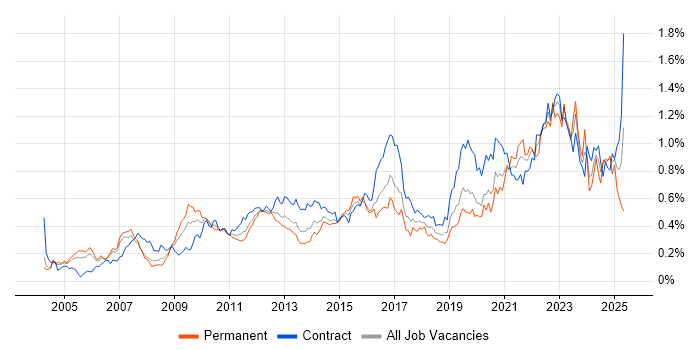Data Architect
Central London > City of London
The median Data Architect salary in the City of London is £98,500 per year, according to job vacancies posted during the 6 months leading to 7 June 2025.
The table below provides salary benchmarking and summary statistics, comparing them to the same period in the previous two years.
|
|
6 months to
7 Jun 2025 |
Same period 2024 |
Same period 2023 |
| Rank |
130 |
150 |
180 |
| Rank change year-on-year |
+20 |
+30 |
+37 |
| Permanent jobs requiring a Data Architect |
10 |
27 |
50 |
| As % of all permanent jobs advertised in the City of London |
0.51% |
0.80% |
1.13% |
| As % of the Job Titles category |
0.55% |
0.84% |
1.17% |
| Number of salaries quoted |
7 |
18 |
41 |
| 10th Percentile |
£89,250 |
- |
£61,250 |
| 25th Percentile |
£92,500 |
£62,500 |
£75,000 |
| Median annual salary (50th Percentile) |
£98,500 |
£88,750 |
£92,500 |
| Median % change year-on-year |
+10.99% |
-4.05% |
+5.71% |
| 75th Percentile |
£106,875 |
£112,500 |
£110,000 |
| 90th Percentile |
£114,000 |
£128,750 |
£115,000 |
| Central London median annual salary |
£110,000 |
£87,500 |
£90,000 |
| % change year-on-year |
+25.71% |
-2.78% |
+2.86% |
For comparison with the information above, the following table provides summary statistics for all permanent IT job vacancies in the City of London. Most job vacancies include a discernible job title that can be normalized. As such, the figures in the second row provide an indication of the number of permanent jobs in our overall sample.
| Permanent vacancies in the City of London with a recognized job title |
1,834 |
3,229 |
4,259 |
| % of permanent jobs with a recognized job title |
93.57% |
96.22% |
96.25% |
| Number of salaries quoted |
1,385 |
2,510 |
3,540 |
| 10th Percentile |
£41,250 |
£41,250 |
£41,988 |
| 25th Percentile |
£52,500 |
£53,750 |
£55,000 |
| Median annual salary (50th Percentile) |
£72,500 |
£73,750 |
£75,000 |
| Median % change year-on-year |
-1.69% |
-1.67% |
+3.45% |
| 75th Percentile |
£95,000 |
£95,000 |
£97,500 |
| 90th Percentile |
£120,000 |
£112,500 |
£115,000 |
| Central London median annual salary |
£72,500 |
£72,500 |
£74,000 |
| % change year-on-year |
- |
-2.03% |
+2.07% |

